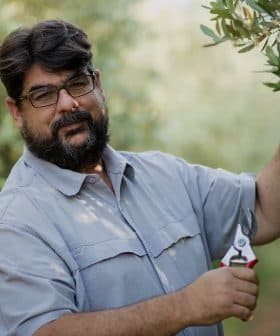A Climate Disaster is Already Underway, United Nations Report Warns
Warming average temperatures have already caused irreversible changes to the earth’s climate. The Mediterranean basin is among the most affected areas.
A report from the United Nations IPCC confirms that human activities are causing irreversible climate change, with global warming affecting every region and the average temperature already 1.1 ºC warmer than pre-industrial levels. The report warns that without immediate action, temperatures could rise between 2 ºC and 4 ºC, leading to catastrophic consequences for the planet and its inhabitants.
A new report from the United Nations agency on climate change is provoking reactions throughout the world.
According to the dozens of international scientists and experts at the Intergovernmental Panel on Climate Change (IPCC), it is now proven that the warming of the atmosphere, ocean and land is happening, and human activities cause them.
The (Mediterannean) basin climate is unique, and it is changing at a faster pace than elsewhere.
The report is a first step toward the Sixth Assessment Report (AR6), which is due next year and is steering the political debate in many countries. It demonstrates how Earth’s climate has already been changed irreversibly, such as the rise of sea level and the thinning of the ice sheets.
“The evidence is irrefutable: greenhouse gas emissions are choking our planet and placing billions of people in danger,” U.N. Secretary-General António Guterres tweeted. “Global heating is affecting every region on Earth, with many of the changes becoming irreversible. We must act decisively now to avert a climate catastrophe.”
See Also:Europe Introduces Plan to Cut Greenhouse Gas Emissions in Half by 2030Guterres added that this report serves as “a code red for humanity.”
According to the IPCC, human-induced climate change already affects many weather and climate extremes in every region across the globe.
“Evidence of observed changes in extremes such as heatwaves, heavy precipitation, droughts and tropical cyclones and, in particular, their attribution to human influence has strengthened since the Fifth Assessment Report (AR5),” the report said.
While immediate coordinated action could prevent the average temperature from exceeding 1.5 ºC above pre-industrial data, temperatures are already 1.1 ºC warmer, which is a level unseen since the most recent ice age 125,000 years ago, the report said.
Should nothing be done, temperatures could continue to rise in the following decades, between 2 ºC and 4 ºC, impairing human activities and even the sustainability of life in vast areas of the planet.
Dozens of countries could even disappear, according to Mohamed Nasheed, a former Maldive president and coordinator of the group of the so-called “at-risk countries.”
Satyendra Prasad, Fiji’s ambassador and permanent representative to United Nations, defined the report as very alarming.
“It comes out exceeding where we all thought the estimates were,” Satyendra Prasad, Fiji’s ambassador and permanent representative to United Nations, told the Guardian. “It brings forward some of the catastrophic scenarios that we have been thinking about in the Pacific of sea-level rise, loss of low-lying lands and possible loss of entire countries within the century. The timelines for these things will certainly be brought much closer.”
According to the researchers, even a coordinated global effort to cut emissions will probably not be enough to stop the world from surpassing the 1.5 ºC threshold. Still, it could bring temperatures down before the end of the century.
See Also:Climate Change News“We must treat climate change as an immediate threat, just as we must treat the connected crises of nature and biodiversity loss, and pollution and waste, as immediate threats,” said Inger Andersen, IPCC’s executive director.
According to the IPCC, climate change is happening at a level and pace that the world has not seen for thousands of years.
The IPCC authors also underlined how climate warming events, such as the abrupt change in ocean dynamics and circulation, can not be ruled out even in the best scenario.
However, they also specified that the most challenging variable to tackle is how humans respond to climate change threats when it comes to uncertainties in the climate modeling projections.
“We can’t wait to tackle the climate crisis,” United States President Joe Biden said in response to the report. “The signs are unmistakable. The science is undeniable. And the cost of inaction keeps mounting.”
Facing the current crisis generated by some of the largest and dangerous wildfires ever and by the severe drought, California Governor Gavin Newsom added that “nothing about today’s IPCC report should come as a surprise. Even for those that ignored decades of dire warnings from climate scientists, there is no denying what’s right in front of us: a climate crisis.”
According to scientists, many changes in the climate system have become more significant in direct relation to increasing global warming.
“They include increases in the frequency and intensity of hot extremes, marine heatwaves and heavy precipitation, agricultural and ecological droughts in some regions and proportion of intense tropical cyclones, as well as reductions in Arctic sea ice, snow cover and permafrost,” the researchers wrote.
As glaciers in the world retreat at an unseen pace, sea ice coverage in the Arctic in the last 10 years during summertime has been lower than in the previous 1,000 years. Over the past 2,000 years, Earth’s surface temperature has not grown as quickly as it has since 1970.
The report further said that the record hot temperatures recorded from 2011 to 2020 make the decade hottest of the past 6,500 years.
The Mediterranean Basin, the cradle of the olive tree and home to about 95 percent of the world’s olive oil production, is among the areas destined to experience more significant impacts from climate change.
“The basin climate is unique, and it is changing at a faster pace than elsewhere,” Gianmaria Sannino, a climatologist heading the sea level and climate change lab at the European Climate Research Alliance, told Olive Oil Times. “In the Mediterranean, the average temperature has grown more than elsewhere, in the range of 1.2 ºC or 1.3 ºC.”
“In the last 50 years, the temperature has increased on average by 1 ºC in southern Spain,” Ignacio Lorite, a researcher at the Andalusian Institute for Agricultural and Fisheries Research (IFAPA), told Olive Oil Times.
According to Lorite and other experts, olive growers do not currently have a single climate-related issue that will most prominently trouble them.
“The effect of climate change on rainfall is not yet obvious,” he said. “Although drought periods have been identified during the last years, these events have been recurrent in southern Spain for a long time.”
Still, Mediterranean Basin olives and agriculture could pay a high price to the heating climate.
“Heatwaves in the area are going to hit more and more, and they are poised to last longer if no action should be taken to curtail the rising temperatures,” Sannino said.
In their 3,000-page report, the IPCC authors explained that carbon dioxide emissions were higher in 2019 than in the last two million years. In addition, greenhouse gas emissions such as methane and nitrogen dioxide were also much higher than those in the previous 800,000 years.
Among the report’s findings is the pace of sea-level rise, which has been accelerating in the past 3,000 years.
“This report tells us that recent changes in the climate are widespread, rapid and intensifying, unprecedented in thousands of years,” Ko Barrett, the IPCC vice-chair and senior climate advisor for the U.S. National Oceanic and Atmospheric Administration, told the Los Angeles Times. “The changes we experience will increase with further warming.”
Since its first report in 1990, the IPCC has benefited from a growing set of tools to measure and analyze both past and present climate and map and model future change.
The scientists said in the report that they are working with the IPCC to measure “temperature, clouds, winds, ice, snow, ocean currents, sea level, soot and dust in the air and many other aspects of the climate system.”
Satellite systems have increased the depth of the analysis while historical data, records and observations are now integrated with the new measurement techniques.
“Ice cores, sediments, fossils and other new evidence from the distant past have taught us much about how Earth’s climate has changed throughout its history,” the IPCC report said. “While most climate models in 1990 focused on the atmosphere, using highly simplified representations of oceans and land surfaces, today’s Earth system simulations include detailed models of oceans, ice, snow, vegetation and many other variables.”
Guterres further emphasized how the newly published report, “Climate Change 2021: The Physical Science Basis,” is to be considered a tool to understand the dynamics of climate change and its consequences better. He hopes that the report will allow governments throughout the world to inform their policies.
“I count on government leaders and all stakeholders to ensure COP26 is a success,” he said, alluding to the upcoming COP26 summit, which will take place in Glasgow, Scotland, starting October 31.
Share this article









